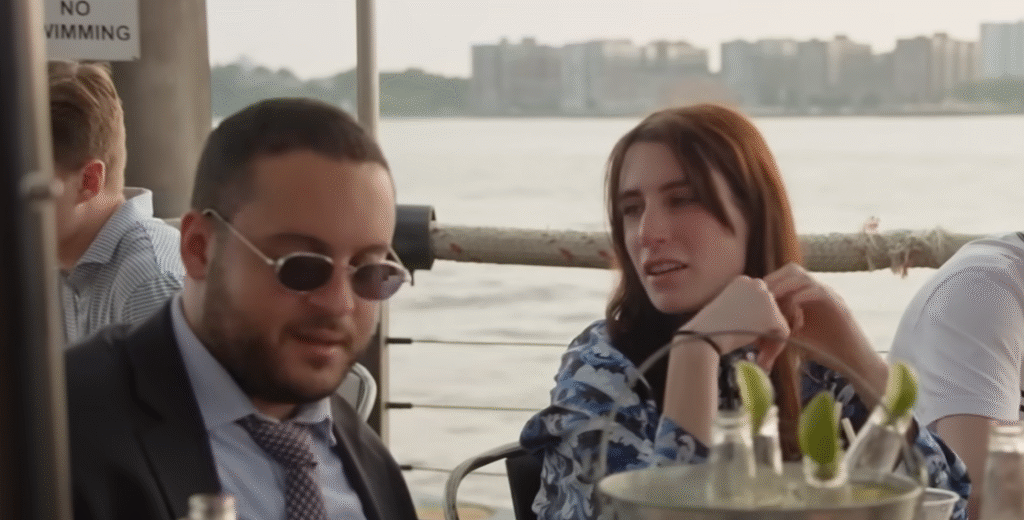Georgia McCann introduced viewers to a well-dressed man who promised ambition and wealth during the Next Gen NYC filming. For a split second, he seemed like the ideal partner—someone who was prepared to establish not just a future with Georgia but also a nightclub she named Club Club. His name was Omar Zaki. The truth, however, came to light as the conclusion did, and the events that followed bore a striking resemblance to the plot of a modern fairy tale with a warning.
Omar had the mannerisms, appearance, and confidence of a budding businessman. He confidently discussed venture capital and creating new investor groups while on camera, even offering to provide financial advice to Charlie Zakkour. Whispers, however, had already started behind the scenes. It all started when Emira D’Spain said, “He’s an alleged scammer,” in Episode 8. Simply Google him.
Omar positioned himself as both an investor and a gatekeeper by interfering with Georgia’s career aspirations. Not only was he her boyfriend, but he also pitched a high-concept nightclub concept that combined bowling and nightlife. Omar didn’t think twice about telling people that a million-dollar investment was possible, but he disappeared when it came time to deliver. The split happened quickly and was not only emotional; it was also practical.
Omar Zaki – Profile Summary
| Attribute | Details |
|---|---|
| Full Name | Omar Zaki |
| Nickname | “Crypto Omar” |
| Known For | Ex-boyfriend of Georgia McCann on Next Gen NYC |
| Profession | Crypto investor, startup founder |
| Public Allegations | Alleged scammer, accused of misleading investors |
| Show Mention | Featured through Georgia on Bravo’s Next Gen NYC |
| Relationship Timeline | Dated Georgia for approximately 3 months during filming |
| Business Involvement | Claimed investor in Georgia’s nightclub concept “Club Club” |
| Breakup Location | Singapore, during a holiday trip |
| Aftermath | Georgia was stranded, relationship ended abruptly |
| Media Reference | Reality Tea – July 23, 2025 |

Georgia and Omar allegedly got into a fight during a Christmas vacation in Singapore, which ended not only their relationship but also her living arrangement. Georgia’s TikTok claims that he “cut her off financially” over night. “You’re living in a $10,000 apartment one day,” she remarked. “Your boxes are outside someone else’s hallway the next time.”
Charlie, who graciously offered a place to crash, was that someone else, but the emotional burden of the failing relationship was especially great. In an instant, everything fell apart after Georgia had bet her identity and brand on a man who had promised to help. Omar was able to establish himself as a significant participant in the nascent crypto-social scene in New York by means of strategic alliances and self-assured speech. However, the foundation seemed remarkably void.
Georgia, which was notably grounded in spite of the chaos, remained intact. She redirected instead. She has stated in interviews that although the breakup was “logistically rough,” it made her stop “living vicariously through someone else.” Her current projects, many of which she says are now less reliant on others and much more in line with her long-term objectives, were sparked by that change. Georgia has turned a personal setback into a branding opportunity that feels especially genuine by using professional recalibration and strategic resilience.
This saga is particularly telling because it reflects a larger cultural trend. In the last ten years, influencers and entrepreneurs have become more and more involved with people who use associations as leverage and ambition as a disguise. Whether on purpose or by accident, Omar was one of those people. He tried to establish credibility by using Bravo’s networks and profited from his closeness to the cast, but when accountability arrived, he vanished without a word.
These experiences are especially painful for public figures like Georgia and early-stage founders. When trust is lost, it affects more than just feelings; it also has an effect on brand agreements, business momentum, and careers. Not only did the purported scam postpone the opening of a nightclub, but it completely changed the course of a creative entrepreneur who had intended to work with others but was forced to deal with the consequences alone.
Georgia took back control of her story by using social media strategically. Her TikTok was a public declaration of independence, not just a vent. She connected with a generation that has witnessed the blurring of romantic and professional boundaries due to branding, content, and influence by sharing her experience so openly.
Stories like Georgia’s could become especially significant in the years to come. They demonstrate the ease with which influence can be manipulated and the ease with which legitimacy can be created. They also emphasize the fortitude needed to turn from betrayal to opportunity without becoming mired in resentment. Georgia’s strategy has worked especially well to rebuild public confidence and bolster her reputation.
Omar has not publicly addressed the accusations, but it is still largely unknown where he is now and what he is doing. According to reports, Charlie has persisted in discussing business ideas with Omar, a decision that greatly disappointed Georgia and put a permanent end to their friendship. Her inner circle was also shattered by the breakup, in addition to her romantic relationship.
What started out as a promising and promising romance has evolved into a masterclass in early warning signs, trusting your gut, and learning to build on your own. Georgia is now more than just a cast member; she is a case study in post-drama reinvention thanks to her ability to transform disruption into design.

